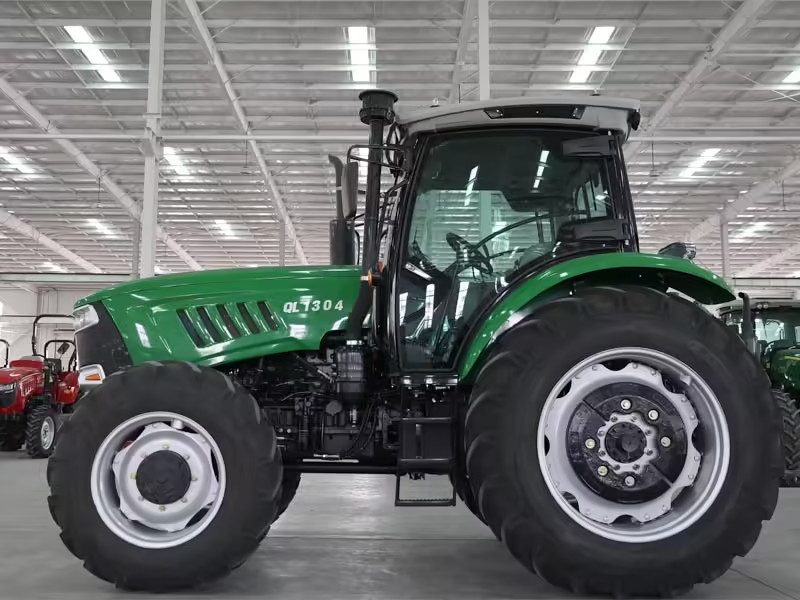Email: [email protected] Whatsapp: 8618266768780
Everything You Need to Know About Tractor Machinery
Welcome to My Blog!
Before we dive into the content, I’d love for you to join me on my social media platforms where I share more insights, engage with the community, and post updates. Here’s how you can connect with me:
Facebook: https://www.facebook.com/profile.php?id=100072217509763
LinkedIn: https://www.linkedin.com/company/74949059/admin/dashboard/
YouTube:https://www.youtube.com/@tractormanufacturer-lc5qz
TikTok: https://www.tiktok.com/@tractormanufacturer
Now, let’s get started on our journey together. I hope you find the content here insightful, engaging, and valuable.

Tractor machinery has become an essential component of modern agriculture, revolutionizing how farmers manage their fields and optimize productivity. From small-scale farms to large agricultural enterprises, tractor machinery plays a pivotal role in enhancing efficiency, reducing labor costs, and ensuring consistent crop yields. In this comprehensive guide, we will explore the different types of tractor machinery, their applications, technological advancements, and how to choose the right equipment for your farming needs.
Types of Tractor Machinery
When considering tractor machinery, it is essential to understand the various types available and their respective applications. Farmers and agricultural professionals often select machinery based on farm size, crop type, and operational requirements.
Standard Tractors
Standard tractors are versatile and widely used in general farming operations. They are suitable for plowing, harrowing, planting, and transporting agricultural materials. These machines typically come with moderate horsepower, ranging from 40 HP to 100 HP, making them ideal for medium-sized farms.
Compact Tractors
Compact tractors are smaller, lighter, and designed for tight spaces, such as orchards or gardens. Despite their size, these tractors are highly efficient for tasks like mowing, tilling, and light transport. Compact models usually range from 20 HP to 50 HP and are excellent for hobby farms or small agricultural plots.
Utility Tractors
Utility tractors are robust and designed for both fieldwork and transport. They can handle heavier attachments, such as loaders or sprayers, and are often used in livestock farms and mixed farming operations. Their horsepower ranges from 50 HP to 120 HP, providing flexibility for various agricultural tasks.
Specialty Tractors
Specialty tractor machinery includes vineyard tractors, orchard tractors, and high-clearance tractors for row crops. These machines are purpose-built to navigate specific farming environments and reduce crop damage while maximizing operational efficiency.
Key Features to Consider in Tractor Machinery
Choosing the right tractor machinery requires careful consideration of several factors, including engine performance, hydraulic systems, transmission types, and fuel efficiency. Here is a comparison table of some essential features of different tractor types:
| Feature | Standard Tractor | Compact Tractor | Utility Tractor | Specialty Tractor |
|---|---|---|---|---|
| Horsepower | 40–100 HP | 20–50 HP | 50–120 HP | 30–80 HP |
| Suitable Farm Size | Medium | Small | Medium–Large | Specialized |
| Common Tasks | Plowing, Planting | Tilling, Mowing | Loading, Spraying | Vineyard, Orchard |
| Engine Type | Diesel | Diesel | Diesel | Diesel/Hybrid |
| Hydraulic Capacity | Moderate | Low | High | Moderate–High |
This table provides a clear overview of the primary features and differences, helping farmers and agricultural businesses make informed decisions.
Technological Advancements in Tractor Machinery
Modern tractor machinery has benefited greatly from technological innovations, enhancing both performance and safety. Some key advancements include precision agriculture integration, fuel-efficient engines, enhanced hydraulics, and smart connectivity.
GPS-enabled tractors can navigate fields with high accuracy, reducing overlap and ensuring optimal crop coverage. New diesel and hybrid engines improve fuel economy while maintaining high power output. Advanced hydraulic systems support heavier attachments and improve operational efficiency. Tractor machinery now also comes with monitoring systems that provide real-time data on machine health, performance, and maintenance needs. These innovations not only improve productivity but also contribute to more sustainable farming practices by minimizing fuel consumption and reducing soil compaction.

Applications of Tractor Machinery
Tractor machinery serves a wide range of applications across agriculture, including plowing and tilling, planting and seeding, crop management, harvesting assistance, and transportation. By selecting the appropriate tractor type and attachment, farmers can maximize output while minimizing labor and operational costs.
How to Choose the Right Tractor Machinery
Selecting the right tractor machinery involves evaluating several factors. Farm size and terrain are important—larger farms may require utility tractors with higher horsepower, while small farms or orchards benefit from compact tractors. The type of crops also matters; high-clearance tractors are suitable for row crops, whereas standard tractors work well for grains and vegetables. Budget and investment should include not only purchase price but also maintenance, fuel, and attachment costs. Reliable dealer support and service ensure spare parts availability and after-sales support, which is essential for long-term operation.
Conclusion
Tractor machinery is an indispensable part of modern agriculture, offering efficiency, reliability, and adaptability. Whether you are running a small farm or managing a large agricultural enterprise, selecting the right tractor machinery enhances productivity, reduces operational costs, and supports sustainable farming practices. By understanding the types, features, and technological advancements of tractor machinery, you can make informed decisions that benefit both your farm and the environment.
FAQ
What is the difference between tractor machinery and farm tractor?
Tractor machinery refers to the overall equipment and systems used in agriculture, including tractors and their attachments. Farm tractors are a subset of tractor machinery, focused on general farm operations.
How do I maintain my tractor machinery for long-term use?
Regular maintenance includes engine checks, hydraulic system inspection, lubrication, and tire monitoring. Following the manufacturer’s maintenance schedule ensures longevity and optimal performance.
Can tractor machinery be customized for different crops?
Yes, many tractors come with modular attachments and adjustable settings, allowing them to be used for a variety of crops and farm conditions.
How do I choose a reliable tractor machinery supplier?
Look for manufacturers with a proven track record, global exports, after-sales support, and quality certifications. Customer reviews and case studies are also helpful references.
Are there eco-friendly options in tractor machinery?
Yes, modern tractors with hybrid engines or fuel-efficient diesel engines reduce emissions and improve sustainability in agricultural operations.
About Us
Shandong Qilu Industrial Co., Ltd. is a professional manufacturer and exporter integrating the development and production of excavators, loaders and tractors. We provide the best service, absolutely.
Recent Posts
Video demo
-1.png)
Contact Us Today!
Any question, quote or inquiry? Click the button to send message.
Qilu Industrial will always here to help.
